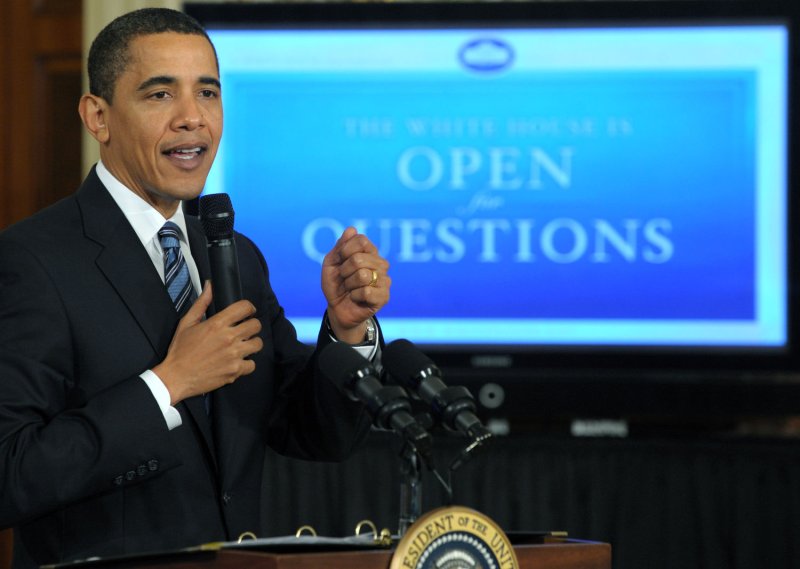U.S. President Barack Obama answers questions from Americans during a first-ever virtual town hall meeting in the East Room of the White House in Washington on March 26, 2009. He faced questions about health care, the economy, education, veterans benefits and others. (UPI Photo/Roger L. Wollenberg) |
License Photo
WASHINGTON, April 8 (UPI) -- The House Friday approved a bill that would prohibit the U.S. government from regulating the Internet, a measure the White House said it was likely to veto.
The House approved Joint Resolution 37 by a vote of 240-179, which would ban the Federal Communications Commission from implementing its December 2010 "Preserving the Open Internet" initiative to ensure so-called net neutrality, The New York Times reported.
The United States Court of Appeals for the District of Columbia has ruled in favor of the House position restricting government authority over Internet service.
"Congress has not authorized the Federal Communications Commission to regulate the Internet," said Rep. Greg P. Walden, R-Ore., who sponsored the bill.
"This is a bill that will end the Internet as we know it and threaten the job, investment and prosperity that the Internet has brought to America," Rep. Henry A. Waxman, D-Calif., said.
U.S. President Barack Obama will likely veto the bill undoing new Web-access rules because it stifles Web advances and hurts consumers, the White House said.
The bill would block a compromise Dec. 21 measure approved by the FCC by a 3-2 vote -- with Democratic commissioners in favor and Republican commissioners opposed -- that prevents fixed-line broadband providers such as Comcast Corp. and Qwest Communications International Inc. from blocking access to Web sites and applications.
But the rules give wireless companies such as AT&T Inc. and Verizon Communications Inc. more latitude in putting limits on access to services and applications.
FCC officials said there were technological reasons for the wireless distinction and the agency would closely monitor the medium's development.
To satisfy both sides in a long debate over network neutrality, the rules do not stop Internet service providers from charging more for faster access.
Net neutrality is an effort to ensure equal access to Web sites and online services.
FCC Chairman Julius Genachowski, a Democrat, said the rules seek "to protect basic Internet values."
The White House said the rules came from "a process that brought together parties on all sides of this issue -- from consumer groups to technology companies to broadband providers."
It said the rules reflect "a constructive effort to build a consensus around what safeguards and protections [are] reasonable and necessary to ensure that the Internet continues to attract investment and to spur innovation."
Disapproving the rules would "raise questions as to whether innovation on the Internet will be allowed to flourish, consumers will be protected from abuses and the democratic spirit of the Internet will remain intact," the White House said.
Many Internet providers, developers and venture capitalists have said they'd accept the rules, The New York Times reported.
The rules "give some assurances to the companies that are building Web applications -- companies like Netflix, Skype and Google -- that they will get even treatment on broadband networks," regulatory analyst Rebecca Arbogast of the Stifel, Nicolaus & Co. financial services firm told the newspaper.
But the non-profit Media Access Project, which seeks to promote the public's interest before Congress, said the FCC rules were "watered down" and "loophole-ridden."
And the non-profit Public Knowledge public-interest group said, "Instead of strong, firm rules providing clear protections, the commission created a vague and shifting landscape open to interpretation."















